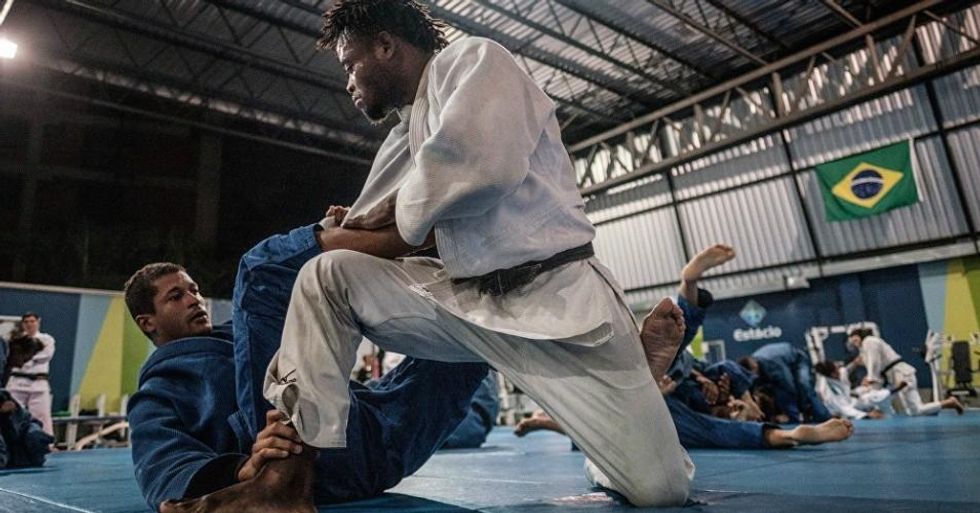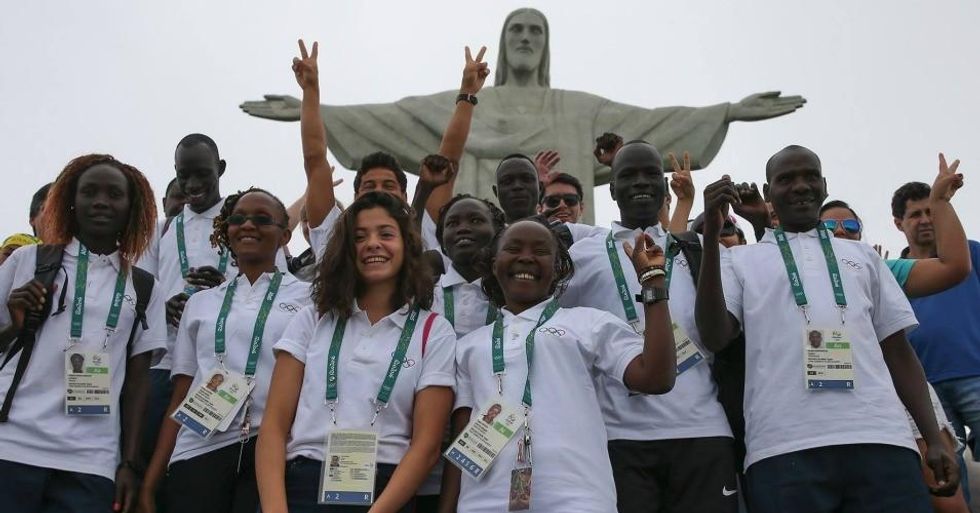

SUBSCRIBE TO OUR FREE NEWSLETTER
Daily news & progressive opinion—funded by the people, not the corporations—delivered straight to your inbox.
5
#000000
#FFFFFF
To donate by check, phone, or other method, see our More Ways to Give page.


Daily news & progressive opinion—funded by the people, not the corporations—delivered straight to your inbox.
It's hard to imagine good news emerging from environmental chaos in Brazil and warfare around the globe, but a team of refugees competing at the Olympics in Rio de Janeiro this month stood in the spotlight on Tuesday, and took the opportunity to urge compassion for displaced people worldwide.
The 10 athletes on the first-ever Refugee Olympic Team (ROT) were given a standing ovation as they joined the International Olympic Committee (IOC).
"We are ambassadors for the other refugees. We cannot forget this chance that you gave us," said Yiech Pur Biel, a track and field athlete originally from South Sudan. "We are not bad people. It's only a name to be a refugee."
Yusra Mardini, a Syrian swimmer, said this year's games make clear that people displaced from their home countries can still contribute to society--countering an argument that has been waged by rightwing opponents of open borders.
"We still are humans. We are not only refugees. We are like everyone in the world. We can do something. We can achieve something," Mardini said. "We didn't choose to leave our homelands. We didn't choose the name of refugees.... We promise again that we are going to do what it takes to inspire everyone."
The New York Times writes of Mardini's story:
Last August, Mardini and her sister Sarah fled war-torn Syria and embarked on a harrowing, monthlong journey through Lebanon, Turkey and Greece, up through the Balkans and Central Europe, to Germany, narrowly dodging capture and death. When their crammed dinghy broke down between Turkey and Greece, she and her sister, also a swimmer, jumped into the water and helped guide the boat to safety.
Mardini's story came to public attention in March when she was identified by the International Olympic Committee as a candidate to compete on a new team of refugees, made up of athletes who are stateless or would otherwise be excluded from the Games. She was thrust into the spotlight, celebrated by the news media as a fresh-faced example of Germany's so-called welcome culture--a story of uplift at the center of the global refugee crisis.
"We wanted to send a signal of hope to all refugees in the world," said IOC president Thomas Bach. "These great athletes will show everyone that, despite the unimaginable tragedies that they have faced, anyone can contribute to society through their talent, and most important, through the strength of the human spirit."
Fans can follow the ROT's stories on Facebook, Twitter, and Instagram. Their live blog is here.


The athletes competing this year are:
Dear Common Dreams reader, The U.S. is on a fast track to authoritarianism like nothing I've ever seen. Meanwhile, corporate news outlets are utterly capitulating to Trump, twisting their coverage to avoid drawing his ire while lining up to stuff cash in his pockets. That's why I believe that Common Dreams is doing the best and most consequential reporting that we've ever done. Our small but mighty team is a progressive reporting powerhouse, covering the news every day that the corporate media never will. Our mission has always been simple: To inform. To inspire. And to ignite change for the common good. Now here's the key piece that I want all our readers to understand: None of this would be possible without your financial support. That's not just some fundraising cliche. It's the absolute and literal truth. We don't accept corporate advertising and never will. We don't have a paywall because we don't think people should be blocked from critical news based on their ability to pay. Everything we do is funded by the donations of readers like you. Will you donate now to help power the nonprofit, independent reporting of Common Dreams? Thank you for being a vital member of our community. Together, we can keep independent journalism alive when it’s needed most. - Craig Brown, Co-founder |
It's hard to imagine good news emerging from environmental chaos in Brazil and warfare around the globe, but a team of refugees competing at the Olympics in Rio de Janeiro this month stood in the spotlight on Tuesday, and took the opportunity to urge compassion for displaced people worldwide.
The 10 athletes on the first-ever Refugee Olympic Team (ROT) were given a standing ovation as they joined the International Olympic Committee (IOC).
"We are ambassadors for the other refugees. We cannot forget this chance that you gave us," said Yiech Pur Biel, a track and field athlete originally from South Sudan. "We are not bad people. It's only a name to be a refugee."
Yusra Mardini, a Syrian swimmer, said this year's games make clear that people displaced from their home countries can still contribute to society--countering an argument that has been waged by rightwing opponents of open borders.
"We still are humans. We are not only refugees. We are like everyone in the world. We can do something. We can achieve something," Mardini said. "We didn't choose to leave our homelands. We didn't choose the name of refugees.... We promise again that we are going to do what it takes to inspire everyone."
The New York Times writes of Mardini's story:
Last August, Mardini and her sister Sarah fled war-torn Syria and embarked on a harrowing, monthlong journey through Lebanon, Turkey and Greece, up through the Balkans and Central Europe, to Germany, narrowly dodging capture and death. When their crammed dinghy broke down between Turkey and Greece, she and her sister, also a swimmer, jumped into the water and helped guide the boat to safety.
Mardini's story came to public attention in March when she was identified by the International Olympic Committee as a candidate to compete on a new team of refugees, made up of athletes who are stateless or would otherwise be excluded from the Games. She was thrust into the spotlight, celebrated by the news media as a fresh-faced example of Germany's so-called welcome culture--a story of uplift at the center of the global refugee crisis.
"We wanted to send a signal of hope to all refugees in the world," said IOC president Thomas Bach. "These great athletes will show everyone that, despite the unimaginable tragedies that they have faced, anyone can contribute to society through their talent, and most important, through the strength of the human spirit."
Fans can follow the ROT's stories on Facebook, Twitter, and Instagram. Their live blog is here.


The athletes competing this year are:
It's hard to imagine good news emerging from environmental chaos in Brazil and warfare around the globe, but a team of refugees competing at the Olympics in Rio de Janeiro this month stood in the spotlight on Tuesday, and took the opportunity to urge compassion for displaced people worldwide.
The 10 athletes on the first-ever Refugee Olympic Team (ROT) were given a standing ovation as they joined the International Olympic Committee (IOC).
"We are ambassadors for the other refugees. We cannot forget this chance that you gave us," said Yiech Pur Biel, a track and field athlete originally from South Sudan. "We are not bad people. It's only a name to be a refugee."
Yusra Mardini, a Syrian swimmer, said this year's games make clear that people displaced from their home countries can still contribute to society--countering an argument that has been waged by rightwing opponents of open borders.
"We still are humans. We are not only refugees. We are like everyone in the world. We can do something. We can achieve something," Mardini said. "We didn't choose to leave our homelands. We didn't choose the name of refugees.... We promise again that we are going to do what it takes to inspire everyone."
The New York Times writes of Mardini's story:
Last August, Mardini and her sister Sarah fled war-torn Syria and embarked on a harrowing, monthlong journey through Lebanon, Turkey and Greece, up through the Balkans and Central Europe, to Germany, narrowly dodging capture and death. When their crammed dinghy broke down between Turkey and Greece, she and her sister, also a swimmer, jumped into the water and helped guide the boat to safety.
Mardini's story came to public attention in March when she was identified by the International Olympic Committee as a candidate to compete on a new team of refugees, made up of athletes who are stateless or would otherwise be excluded from the Games. She was thrust into the spotlight, celebrated by the news media as a fresh-faced example of Germany's so-called welcome culture--a story of uplift at the center of the global refugee crisis.
"We wanted to send a signal of hope to all refugees in the world," said IOC president Thomas Bach. "These great athletes will show everyone that, despite the unimaginable tragedies that they have faced, anyone can contribute to society through their talent, and most important, through the strength of the human spirit."
Fans can follow the ROT's stories on Facebook, Twitter, and Instagram. Their live blog is here.


The athletes competing this year are: